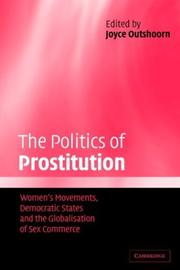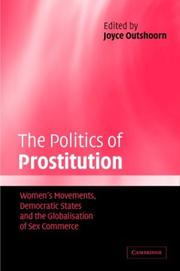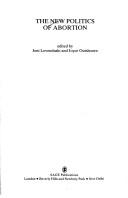| Listing 1 - 10 of 26 | << page >> |
Sort by
|

ISBN: 0521540690 Year: 2004 Publisher: Cambridge Cambridge University Press
Abstract | Keywords | Export | Availability | Bookmark
 Loading...
Loading...Choose an application
- Reference Manager
- EndNote
- RefWorks (Direct export to RefWorks)
#SBIB:044.AANKOOP --- #SBIB:316.346H20 --- #SBIB:324H74 --- Australië --- Europese Unie --- Noord-Amerika --- arbeid, vrouwen --- belangengroepen --- feminisme --- gezondheidszorg --- globalisering --- maatschappelijke vraagstukken --- overheidsbestuur --- seksualiteit --- Positie van de vrouw in de samenleving: algemeen --- Politieke verandering: sociale bewegingen --- Feminism. --- Prostitutes --- Prostitution --- Women's rights. --- Civil rights. --- Legal status, laws, etc. --- Government policy. --- Political aspects. --- Sociology of the family. Sociology of sexuality --- Sociology of work --- Social policy --- Law --- Social problems --- Austria --- Netherlands --- United States --- Spain --- France --- Canada --- Israel --- Sweden --- Great Britain --- Finland --- Italy --- Australia --- Feminism --- Women's rights --- Rights of women --- Women --- Human rights --- Female prostitution --- Hustling (Prostitution) --- Prostitution, Female --- Sex trade (Prostitution) --- Sex work (Prostitution) --- Street prostitution --- Trade, Sex (Prostitution) --- White slave traffic --- White slavery --- Work, Sex (Prostitution) --- Sex-oriented businesses --- Brothels --- Pimps --- Procuresses --- Red-light districts --- Sex crimes --- Call girls --- Female prostitutes --- Girls, Call --- Harlots --- Hookers (Prostitutes) --- Hustlers (Prostitutes) --- Street prostitutes --- Streetwalkers --- Strumpets --- Tarts (Prostitutes) --- Trollops (Prostitutes) --- Whores (Prostitutes) --- Women prostitutes --- Sex workers --- Emancipation of women --- Feminist movement --- Women's lib --- Women's liberation --- Women's liberation movement --- Women's movement --- Social movements --- Anti-feminism --- Civil rights --- Legal status, laws, etc --- Government policy --- Political aspects --- Law and legislation --- Emancipation --- Sex work --- United States of America --- Legal status --- Sex industry --- Human trafficking --- Legislation --- Book

ISBN: 9780511489044 9780521833196 9780521540698 9780511164156 0511164157 0521833191 0521540690 0511164955 9780511164958 0511166109 9780511166105 0511164157 0521833191 0521540690 1107149142 9781107149144 1280437723 9781280437724 0511184328 9780511184321 0511489048 051133141X Year: 2004 Publisher: Cambridge, UK New York Cambridge University Press
Abstract | Keywords | Export | Availability | Bookmark
 Loading...
Loading...Choose an application
- Reference Manager
- EndNote
- RefWorks (Direct export to RefWorks)
The most effective way to deal with prostitution has always been hotly debated by governments and women's movements alike. Feminists want it abolished or regulated as sex work; governments have to safeguard public health and order. This book, first published in 2004, shows how women's movements in Western Europe, North America and Australia have affected politics on prostitution and trafficking of women since the 1970s, asking what made them successful in some countries but a failure in others. It also assesses whether government institutions to advance the status of women - so-called women's policy agencies - have played a key role in achieving policy outcomes favourable to movement demands. Written by an international team of experts and based on original sources, all chapters follow the same framework to ensure comparability. The final chapter offers an overall comparison identifying what makes women's movements successful and women's agencies effective, presenting the case for 'state feminism'.
Prostitution --- Feminism. --- Women's rights. --- Prostitutes --- Rights of women --- Women --- Women's rights --- Human rights --- Call girls --- Female prostitutes --- Girls, Call --- Harlots --- Hookers (Prostitutes) --- Hustlers (Prostitutes) --- Street prostitutes --- Streetwalkers --- Strumpets --- Tarts (Prostitutes) --- Trollops (Prostitutes) --- Whores (Prostitutes) --- Women prostitutes --- Sex workers --- Emancipation of women --- Feminist movement --- Women's lib --- Women's liberation --- Women's liberation movement --- Women's movement --- Social movements --- Anti-feminism --- Female prostitution --- Hustling (Prostitution) --- Prostitution, Female --- Sex trade (Prostitution) --- Sex work (Prostitution) --- Street prostitution --- Trade, Sex (Prostitution) --- White slave traffic --- White slavery --- Work, Sex (Prostitution) --- Sex-oriented businesses --- Brothels --- Pimps --- Procuresses --- Red-light districts --- Sex crimes --- Government policy. --- Political aspects. --- Legal status, laws, etc. --- Civil rights. --- Civil rights --- Law and legislation --- Emancipation --- Social Sciences --- Sociology --- Sex work
Book
Year: 1986 Publisher: Amsterdam
Abstract | Keywords | Export | Availability | Bookmark
 Loading...
Loading...Choose an application
- Reference Manager
- EndNote
- RefWorks (Direct export to RefWorks)
Book
Year: 1973 Publisher: Nijmegen Socialistische Uitgeverij
Abstract | Keywords | Export | Availability | Bookmark
 Loading...
Loading...Choose an application
- Reference Manager
- EndNote
- RefWorks (Direct export to RefWorks)
Book
Year: 1973 Publisher: Nijmegen SUN
Abstract | Keywords | Export | Availability | Bookmark
 Loading...
Loading...Choose an application
- Reference Manager
- EndNote
- RefWorks (Direct export to RefWorks)
Book
Year: 1986 Publisher: 's-Gravenhage Vuga
Abstract | Keywords | Export | Availability | Bookmark
 Loading...
Loading...Choose an application
- Reference Manager
- EndNote
- RefWorks (Direct export to RefWorks)

ISBN: 080398006X 0803980078 9780803980075 Year: 1986 Volume: 11 Publisher: London: Sage,
Abstract | Keywords | Export | Availability | Bookmark
 Loading...
Loading...Choose an application
- Reference Manager
- EndNote
- RefWorks (Direct export to RefWorks)
Sociology of the family. Sociology of sexuality --- Abortion --- Political aspects --- Congresses --- 173.4 --- #SBIB:316.356.2H3650 --- 343.62 <41> --- Abortus provocatus. Contraceptie. Kunstmatige inseminatie. Proefbuisbaby's --- Gezinssociologie: abortus --- Delicten tegen hulpbehoevenden en minderjarigen. Illegale abortus--Verenigd Koninkrijk van Groot-Brittannië en Noord-Ierland --- Congresses. --- 343.62 <41> Delicten tegen hulpbehoevenden en minderjarigen. Illegale abortus--Verenigd Koninkrijk van Groot-Brittannië en Noord-Ierland --- 173.4 Abortus provocatus. Contraceptie. Kunstmatige inseminatie. Proefbuisbaby's --- Abortion, Induced --- Feticide --- Foeticide --- Induced abortion --- Pregnancy termination --- Termination of pregnancy --- Birth control --- Fetal death --- Obstetrics --- Reproductive rights --- Political aspects&delete& --- Surgery --- Abortion - Political aspects - Europe - Congresses --- Abortion - Political aspects - United States - Congresses

ISBN: 9780230516618 0230516610 1349354503 9786611780470 1281780472 0230591426 9781349354504 Year: 2007 Publisher: Basingstoke Palgrave Macmillan
Abstract | Keywords | Export | Availability | Bookmark
 Loading...
Loading...Choose an application
- Reference Manager
- EndNote
- RefWorks (Direct export to RefWorks)
By the mid 1990s, most western states, responding to the challenge of women's movements, had developed 'state feminism': institutions and policy measures to achieve gender equality. These developments have since been challenged by major political changes over the last decade, such as the increasing importance of the European Union and the United Nations, regionalization and decentralization, reforms of the welfare state and government and the introduction of gender mainstreaming. Women's policy institutions were also confronted with increasing diversity amongst women and amongst women's movements. This book analyses how these institutions in twelve western democracies have responded to the changes: Austria, Australia, Belgium, Finland, France, Germany, Great Britain, Italy the Netherlands, Spain, Sweden and the United States. Were they able to maintain or enhance their roles or were they downsized? What was their relationship with women's movements groups? And why did some fare well and others lose out over the last decade?
Feminist theory. --- Feminism --- #SBIB:316.346H20 --- Emancipation of women --- Feminist movement --- Women --- Women's lib --- Women's liberation --- Women's liberation movement --- Women's movement --- Social movements --- Anti-feminism --- Feminist philosophy --- Feminist sociology --- Theory of feminism --- Government policy. --- Cross-cultural studies. --- Positie van de vrouw in de samenleving: algemeen --- Emancipation --- Philosophy --- Feminist theory --- Cross-cultural studies --- Government policy
Book
Abstract | Keywords | Export | Availability | Bookmark
 Loading...
Loading...Choose an application
- Reference Manager
- EndNote
- RefWorks (Direct export to RefWorks)
Political philosophy. Social philosophy --- Sociology of the family. Sociology of sexuality --- Sociology of work --- Feminism --- Working-class women --- Socialism --- Book --- Edited volume --- Netherlands
Book
Abstract | Keywords | Export | Availability | Bookmark
 Loading...
Loading...Choose an application
- Reference Manager
- EndNote
- RefWorks (Direct export to RefWorks)
Sociology of the family. Sociology of sexuality --- Community organization --- Social policy --- Feminism --- Equal opportunities --- Government policy --- Women's movements --- Book --- Equal opportunity policies --- Great Britain --- Germany --- Austria --- France --- Italy --- Spain --- Finland --- Sweden --- Netherlands --- Belgium --- Europe --- United States of America --- Australia
| Listing 1 - 10 of 26 | << page >> |
Sort by
|

 Search
Search Feedback
Feedback About UniCat
About UniCat  Help
Help News
News